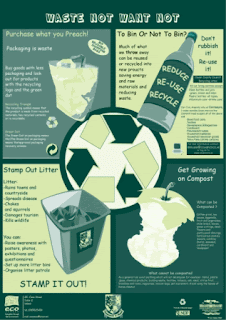It is a very common misconception among a lot of people that energy conservation is only limited to buying new gadgets that consume less amount of electricity. A lot of people don’t see the big picture. For a lot of us, very less thought is given to how a simple change in our attitudes towards some simple tasks can result in a mammoth effort towards energy conservation. Many of us do not realize that lower consumption and more planning will go a long way in helping energy conservation and will also save us money in the process.
We live in an age of consumerism. People get attracted to some widely advertised products and buy it at the first possible whiff of a good offer. Whether or not they actually need the product they buy may come as a second thought. This is especially true of food articles. When we are home, we stuff the food articles that we buy on a shopping spree into the back of a fridge. A lot of times it may happen, that we forget about something and by the time we get it out of fridge to eat it, it has become stale or has overreached its expiry date. Then we are forced to throw it away.
How much energy and money could we have saved by buying only what is required?
This is only at home. You would have to be blind to not realize the amount of food that goes to waste in the mess right here in the campus. Upon request, I got some statistics from last year of the daily food wastage in A-mess. Just get a hold of this. On 9th October 2009, 14 kg of food got wasted in breakfast, 75 kg in lunch, 20 kg in snacks and 71 kg in dinner. All in all, 185 kg of food got wasted that day. This was pretty much the case for all the days that the mess administration conducted a weighing of the wasted food. There was no bio-gas facility in the campus then, and there is none even now, which means that all this food goes straight to the dumping pit. And talking about the environmental cost of food, let us take bread as a simple example. It takes fertilizers to make crops grow. Those fertilizers are produced from crude oil derivatives. It takes oil to drive the giant machines that cut and clean the crop. It takes energy to build and operate the machines that separate the grains and chaff. Then, machines are used to grind the grains, process the flour and bake the bread. Then again, energy and more materials for packing, then transport.
Conclusion: One kg bread takes about 4.4 MJ energy to just produce and transport to average consumer home. That comes to about 1 million calories of energy. If the bread is thrown away, then there is additional energy to transport it as trash. This means wasted money, wasted energy and wasted environmental resources.
Don’t we know that people die of hunger in this country? Don’t we know that we are wasting money, energy and precious environmental resources when we waste food? The answer to all these questions, is definitely a yes. Even then, why do we continue to be so indifferent? It's all in the attitude-a highly irresponsible one! It's time to grow up and become more responsible towards the nature of our actions and its consequences.
I came across an article in the internet recently. They suggested some good methods to reduce our ‘tendency’ to waste food. Here are some of the things that we can do:
1. Start keeping track – First step of changing anything is being aware of it fully. When you buy food, keep track of it. When you eat food, make a note somewhere. When you throw away food, make a note. Do a food balance sheet somehow. This will help you identify a lot of bad habits.
2. Plan food- This is easier said than done, but still worth trying. Even if you come up with a plan with one good point, it is worth it in the long run.
3. The Toyota solution- Buy just in time. Do not buy a bulk of food in advance. Buying in bulk might save you some money in the food price. But your preferences change, your get bored, something else comes up. So you end up wasting food you bought and the savings go down the drain. So if possible, buy only two or three days worth of food at a time and buy that well planned. Decide how many lunches you will eat and what you will eat for each lunch, etc.
**One thing that would be relevant to our life in the campus would be to take just enough food on our plates in the mess. There’s no need to pile on food on our plates. It would take less than 2 minutes to go and get a second helping if you require more food.
All of us know this as highly educated individuals should. Yet, we remain indifferent. Don’t you think that it’s a far better habit than throwing away the food?
As I said at the outset of this article, a little change in our attitude will go a long way in helping the cause of energy conservation.




Nice post....I think we should have posters in the messes which give the message of save reducing the food thrown away. I think the EPAC club should look into this quickly.
ReplyDeleteYes, indeed!!!!
ReplyDeleteIt's quite an issue and has to be looked into!!
Pretty interesting! :) Thx!
ReplyDelete